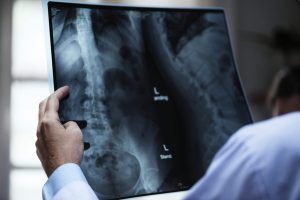When Should You Worry About Pain After a Car Accident?
It’s common to feel minor aches and pain immediately after a car accident, and it’s also not unusual for pain symptoms to develop days or even weeks after a collision. In these cases, delayed pain could be a sign of a serious injury that you weren’t aware of at the time of the accident.
Even if you feel fine in the moments after a collision, always seek medical attention as soon as possible. The faster you’re examined by a medical professional, the faster you can diagnose your injury—and ensure you haven’t sustained any severe, life-threatening damage.
Even when you don’t feel pain symptoms right away, immediate medical care may help prevent chronic pain and other negative repercussions down the line. Swift intervention can protect your right to compensation after a crash. Take a look at when you should worry about pain after a car accident and what your symptoms may mean.
Is Being Sore After a Car Accident Normal?
Yes, soreness is very normal after a car accident. Accidents often involve the weight of 3,000 pounds of steel colliding into your vehicle, possibly at high speeds. Your vehicle may have screeched to halt, veered into another object, or flipped over. Any of these situations put your body in incredibly dangerous positions that could cause significant injuries.
Soreness after a car accident is typically caused by trauma to soft tissue, like muscles, tendons, ligaments, and nerves. Pain and stiffness may stem from an injury directly to the soft tissue or the structures around it, such as bones, joints, and organs. If minor pain after a car accident begins to worsen in the days following a crash, you should seek medical attention.
How Long Does Pain Last After a Car Accident?
On average, pain after a car accident lasts between six and eight weeks. A minor soft tissue injury may heal on its own in as little as three weeks but more severe injuries may take several months to heal fully. To better understand how long your pain will last after a car crash, seek a formal diagnosis from your primary care provider (PCP) or local emergency room.
How Long Can it Take for Injuries to Show Up Following a Car Accident?
It’s a common misconception that all injuries show up right away after a wreck. More often than not, injury symptoms gradually develop over hours or days. These symptoms are called delayed pain. Delayed pain usually begins 24 to 48 hours after a crash but may take several days or even several weeks to develop, depending on the injury.
There are two reasons why it can take time for injuries to present after an accident. First, crashes cause a spike in shock and adrenaline, releasing hormones that numb your body against pain signals. Second, traumatic injuries often generate inflammation at the injury site to protect the area from further harm and momentarily mask the severity of the damage.

What Symptoms Should You Look For?
It’s common to feel muscle aches and fatigue in the hours after a car accident. The stress of an accident alone can deplete your energy and make you feel sore all over. However, never chalk up aches and pains to stress alone. Always visit a doctor to confirm you have not been injured.
If you have not visited a medical professional and begin to experience delayed pain symptoms, there is a chance you may have suffered a serious crash injury. Take a look at the delayed symptoms you should look for that could signify severe car accident injuries.
Headaches
Headaches can be a symptom of many injuries, several of which require medical care to prevent further damage. Headaches at the front of the skull may indicate a type of brain injury, such as a concussion. Headaches accompanied by memory loss, insomnia, nausea, and vomiting may be a sign of traumatic brain injury (TBI). Traumatic brain injuries require immediate medical attention.
Aside from trauma to the skull, blunt force to the neck may also cause headaches. Headaches located at the bottom of the skull may be a sign of a whiplash injury. Whiplash happens when the neck and head rapidly bend backward and forward and will cause neck pain and soreness. Whiplash is one of the most common neck injuries people suffer after a crash, especially in rear-end collisions.
Neck Pain
Neck pain after a car accident is very common, and delayed aches in the neck often indicate whiplash. Whiplash injuries are often referred to as neck sprains and neck strains since they tear soft tissues in the cervical spine. Whiplash-associated disorders damage the muscles, ligaments, and tendons of the neck and upper back. Without treatment, neck pain and stiffness can become chronic.
Shoulder Pain
Shoulder pain after a crash may begin at the scene of the accident or several hours later. Most commonly, this pain is caused by a seatbelt injury to the shoulder like a strain. Shoulder pain with swelling and redness by the neck may also be connected to whiplash-associated disorders.
In severe cases, shoulder pain may occur with chest pain after a car accident. If you’re experiencing pain, shortness of breath, and an irregular heartbeat, visit a doctor immediately to ensure you haven’t sustained heart damage.
Back Pain
Delayed back pain after a collision is not something to be taken lightly. Back injuries are frequently caused by damage to crucial structures in the spine, like vertebrae, spinal discs, and nerves. Lower back pain could be caused by a herniated disc or a spinal disc that’s been partially ruptured by the force of impact. Without treatment, a herniated disc may cause recurring back pain.
A fractured vertebrae may cause upper back pain. In severe cases, a fractured vertebra might send small splinters of bone into the spinal canal and injure the spinal cord. A spinal cord injury may cause paralysis—the permanent loss of function in the arms or legs.
Stomach Pain
Delayed stomach pain may be caused by striking the abdomen against the steering wheel, seat belt, or airbag. Abdominal pain accompanied by bruises, swelling, nausea, and vomiting may be a sign of an internal injury, like internal bleeding or a blood clot. Internal injuries can be life-threatening when left untreated, so be sure to visit a doctor immediately for stomach pain after an accident.
Numbness or Tingling
Numbness and tingling are two symptoms that are frequently associated with nerve damage or spinal cord injury. Your spinal cord is essentially a bundle of nerves. When your spinal cord or one of the other seven trillion nerves in your body are damaged, they can interrupt communication between your brain and the rest of your body. This lapse in communication is what causes numbness or tingling.
Numbness and lower back pain is often caused by a pinched nerve caused by a herniated disc. Numbness and tingling in the extremities like the hands, arms, feet, and legs are often caused by direct damage to the spinal cord. If you experience numbness or tingling, you should seek Medical attention to ensure you do not lose feeling permanently.
Dizziness
Dizziness after a car crash often feels like you’re going to lose balance or can’t see straight. In most cases, delayed dizziness means you may have suffered a traumatic brain injury (TBI) or concussion. If you’re experiencing dizziness, fainting, or memory loss, visit a doctor for a diagnosis.
Behavioral Changes
While the trauma of a car accident can make anyone feel on edge, there’s a difference between minor stress and severe behavioral changes. Changes in sleeping or eating habits could indicate a brain injury. anxiety, depression, or flashbacks might be a sign of post-traumatic stress disorder (PTSD). Even though these are emotional symptoms and not physical, they still require care.

A doctor with a patient’s x-ray film
When Should You Worry About Pain After a Car Accident?
If pain continues to worsen in the days after an accident, you may have suffered a serious injury. You should worry about any pain that causes you to lose function in your arms or legs or if pain symptoms do not alleviate with treatment options like medication.
Most importantly, you should worry about any pain for which you have not received medical care. Your primary care physician (PCP) or emergency room technician should assess your pain as soon after an accident as possible, even if you initially didn’t believe the injury was serious. A doctor can order an X-ray, MRI, or CT scan to assess the damage and prescribe a treatment plan.
How to Deal with Pain After a Car Accident
Pain after a car accident should be treated immediately. Immediate treatment will reduce the risk of the injury worsening and causing lasting damage. Depending on the type of injury, a doctor may recommend a treatment plan for several weeks to address the issue. Treatment may include physical therapy, chiropractic care, massage therapy, or prescription medication.
Unfortunately, weeks of medical care will incur expensive medical bills. Kentucky is a choice no-fault state, so you will likely need to file a personal injury claim with your own insurance company to receive compensation for your damages. If your damages max out your insurance policy, you can work with a personal injury attorney to file a lawsuit against the at-fault driver.
At Bryant Law Center, our car accident attorneys have decades of experience fighting for fair compensation for individuals injured by other drivers in a car crash. Do not suffer pain after a car accident without exploring your options with a lawyer. Contact the attorneys at Bryant Law Center today for a free case evaluation to learn more about how to seek compensation for your accident injuries.
